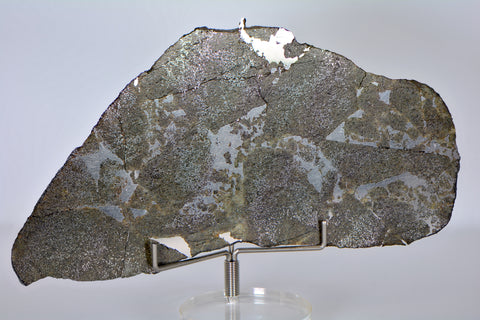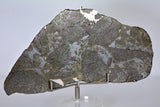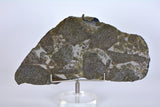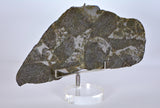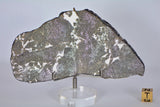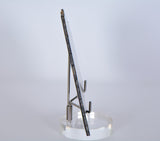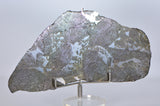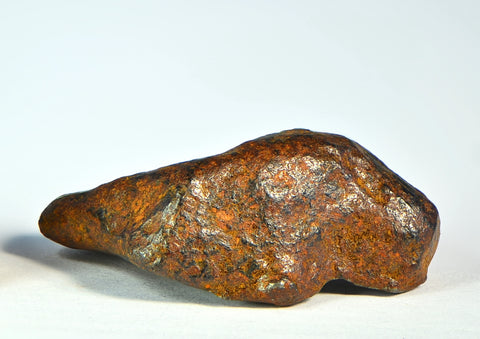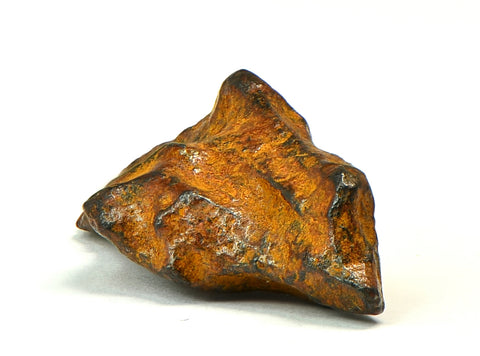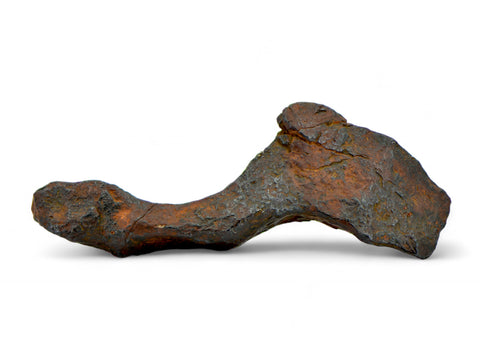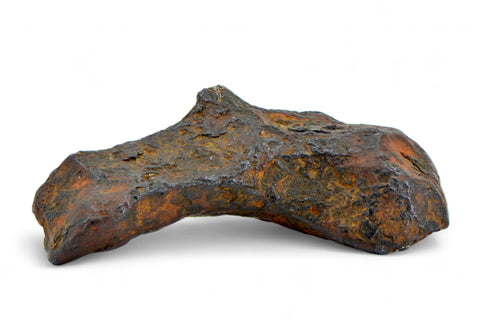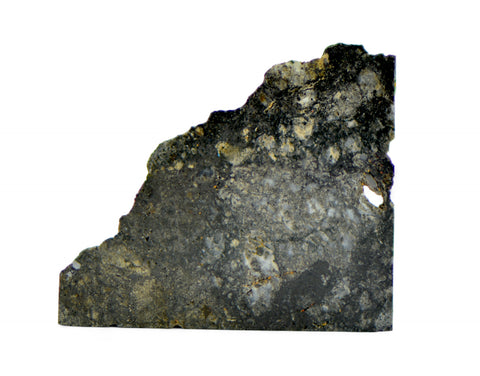Stunning 49.4g PUNGGUR Meteorite Slice Witnessed Fall Indonesia
| Punggur | |||||||||||||||||||||||||||||||||||
|---|---|---|---|---|---|---|---|---|---|---|---|---|---|---|---|---|---|---|---|---|---|---|---|---|---|---|---|---|---|---|---|---|---|---|---|
| Basic information |
Name: Punggur This is an OFFICIAL meteorite name. Abbreviation: There is no official abbreviation for this meteorite. Observed fall: Yes, confirmed fall Year fell: 2021 Country: Indonesia Mass:  6.6 kg 6.6 kg |
||||||||||||||||||||||||||||||||||
| Classification history: |
This is the only approved meteorite classified as H7-melt breccia. Search for other: H chondrites, H chondrites (type 4-7), Melted chondrites, Ordinary chondrites, and Ordinary chondrites (type 4-7) |
||||||||||||||||||||||||||||||||||
| Comments: | Approved 23 Apr 2021 | ||||||||||||||||||||||||||||||||||
Writeup |
Writeup from MB 110:
Punggur 5°00’22.4"S, 105°16’11.9"E Lampung, Indonesia Confirmed fall: 28 Jan 2021 Classification: H7-melt breccia History: (Roberto Vargas, Mark Lyon, Elang Erlangga) At 9:53 pm local time (14:53 UTC) on 28 January 2021, residents in southern Sumatra heard loud booms that shook their houses. The sonic boom was registered by the Indonesia Tsunami Early Warning System (InaTEWS). Eyewitnesses report the bolide was traveling in a W/NW direction. A 2.2 kg stone crashed through the roof of a house in the Punggur district (Kecamatan Punggur), Central Lampung, Sumatra at 5°00’22.4"S 105°16’11.9"E. The stone embedded itself in the soil beside the house. Residents of the village submerged this mass in water, believing the water to have healing properties. That same night in neighboring Gunung Sugih village (5°0’35.1518"S 105°13’13.9019"E) a woman found a ~50 g specimen that reportedly bounced off of a nearby roof. The following morning three additional masses were found: a 138 g mass that crashed through a roof and landed on a bed (4°59’46.6"S 105°14’47.6"E); a ~1700 g mass in a flooded hole in a rice paddy (4°59’56.2254"S 105°15’23.3518"E); and, a 2511 g mass was recovered from a rice paddy (4°59’50.3722"S 105°15’13.7405"E). Pieces from the ~1700 g mass were used for the classification. Further fall information and photos are found at karmaka.de. Physical characteristics: Five stones were recovered - 2511 g, 2200 g (the first stone), ~1700 g, 138 g, and 50 g. The stones are angular to blocky, exhibit a few shallow regmaglypts, and covered with thick matte to shiny fusion crust. Petrography: (L. Garvie, ASU) Based on an 8 × 7 cm slice and 1.6 × 1.4 cm probe mount. The interior of a fresh cut stone shows a visually appealing panorama dominated by a light-grey, crystalline, matrix hosting clasts with abundant small metal grains and separated by anastomosing network of mm- to cm-sized metal and coarse-grained silicates. Most silicates are clear and transparent. The 8 × 7 cm slice has 15 areal% metal+sulfide. Breccia clast: The largest breccia clast (3 × 2 cm) is rounded and contains a uniform scattering of anhedral metal (grain sizes 50 to 750 μm) and subordinate troilite (to 300 microns), and 7.1 areal% metal and 3.6 areal% troilite. Kamacite and troilite grains are single crystal and lack shock features. Feldspar is anhedral and to 300 μm across. Olivine (often containing scattered 1-to-5-micron-sized spheres of metal and sulfide), and pyroxene to 0.5 mm. Metal grains dominated by single crystal kamacite, some with taenite rims and lath martensite cores. Minor chromite to 300 μm. Rare Ca-Na-Mg phosphate to 150 microns. One 10-μm-sized native Cu grain. Interbreccia material: Coarse-grained, with olivine to 1 mm, pyroxene to 0.75 mm. Feldspar to 0.5 mm, but larger interconnected masses to several mm occur. The feldspar poikilitically encloses rounded pyroxene and olivine chadacrysts. Metal anhedral, mm and occasionally to 2 cm in length, sinuous with scalloped outlines. Single-crystal kamacite dominates with subordinate taenite. Geochemistry: Olivine, Fa19.9±0.3, FeO/MnO=40.0±2.3 (n=18); low Ca pyroxene Fs17.3±0.1Wo2.5±0.4 (Fs1.3-7.0), FeO/MnO=23.5±1.2 (n=11); high Ca pyroxene Fs7.5Wo43.1 (n=1); Feldspar - limited data suggests two compositional populations, Ab83.6±0.6An9.6±0.8 (n=4) and Ab77.0±0.6An20.1±0.7 (n=2); kamacite Ni 6.7±0.2 wt%, Co 0.5±0.05 wt% (n=8) ; and taenite with 23 to 35 wt% Ni (n=8). Classification: H7-melt breccia. The Fa, Fs, and Co concentration in kamacite are consistent with an H chondrite. The rock is coarse grained, but lacks a clear igneous texture, and the lack of relict chondrules and Wo content of orthopyroxene indicate a type 7.. The brecciated nature and extensive metal veining are consistent with a melt breccia. The absence of Neuman bands in the kamacite, and single-crystal troilite lacking shock lamellae is indicative of a low meteorite with low shock. W0. Specimens: Mark Lyon, Roberto Vargas, and Norman Lebron Jr acquired the ~1700 g and 2511 g main masses. The 2200 g and 138 g stones with Jay Piatek. ASU, 21 g. |
||||||||||||||||||||||||||||||||||
| Data from: MB110 Table 0 Line 0: |
|
||||||||||||||||||||||||||||||||||
We Also Recommend

